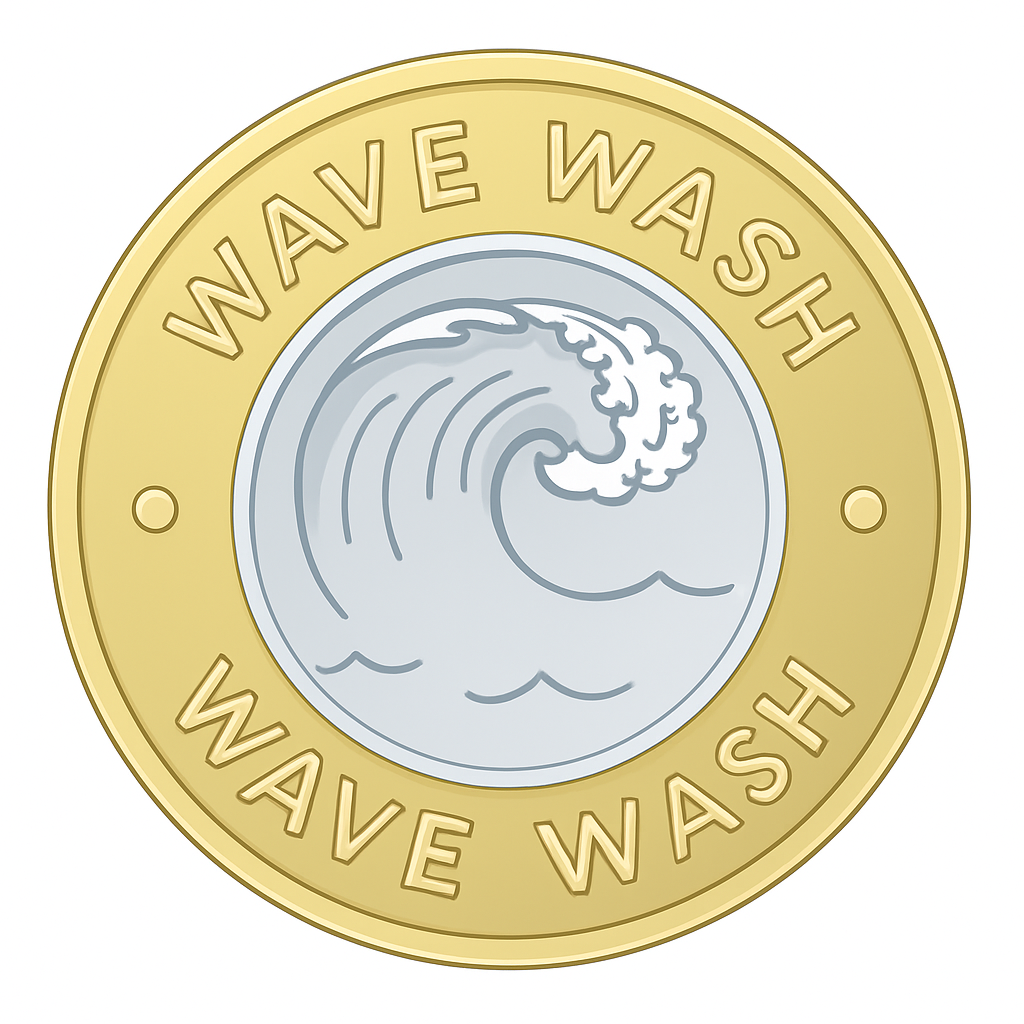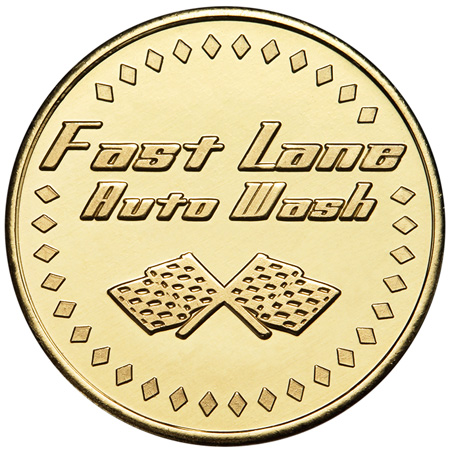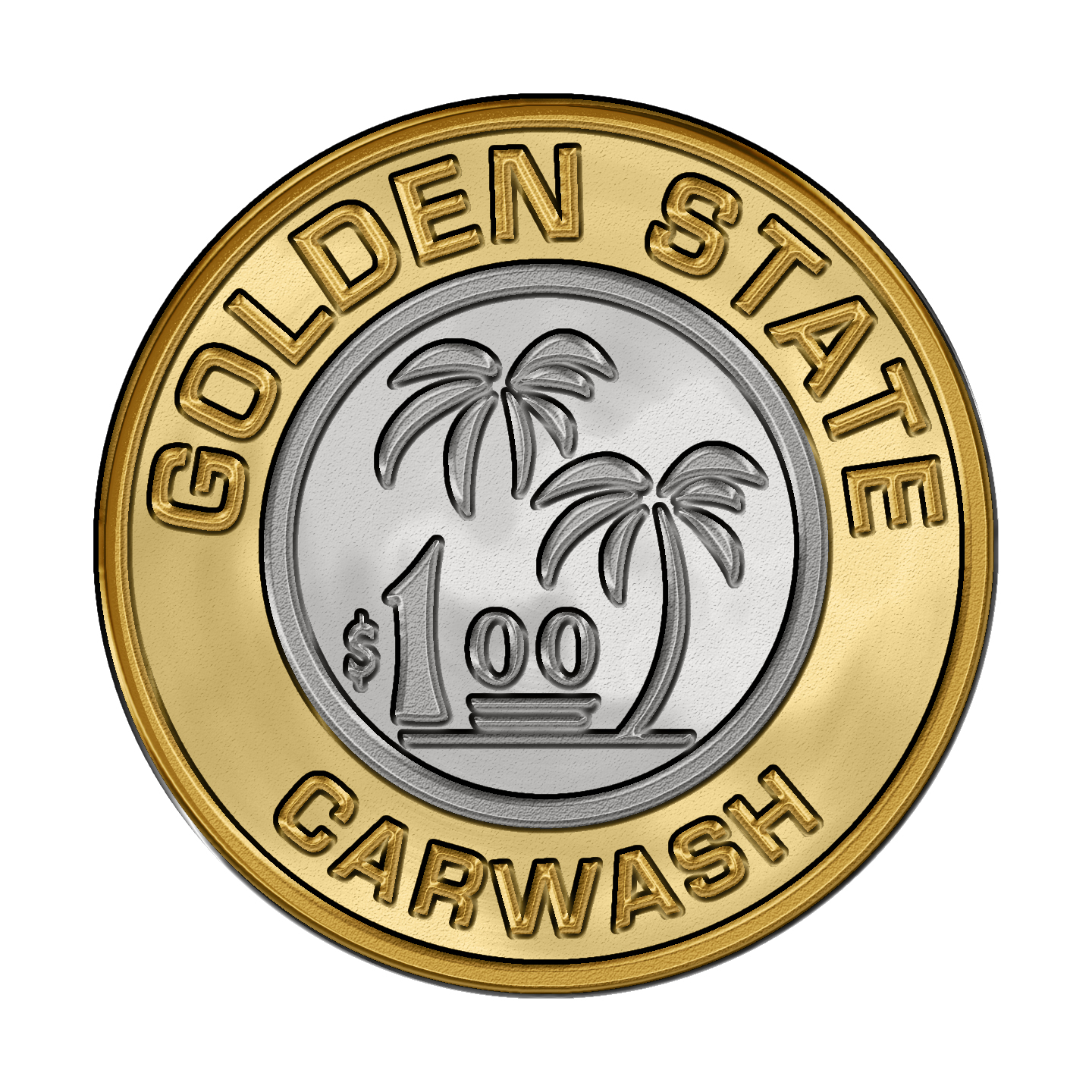
Tokens can significantly impact your car wash marketing efforts - often in ways that you may not have considered.
Let's look at the "4-Ps" of marketing - product, price, place, and promotion - and see where tokens play a role. While promotional opportunities are most prevalent, there are other advantages as well.
Promotional Opportunities
While some people view tokens as another form of payment, astute car wash operators view them as “mini billboards.” Each time that customers reach into their pockets you have the opportunity to establish your brand, and set your car wash apart from competitors. Whether customers keep unused tokens with their pocket change, in an ashtray or cup holder on the bureau, you can create an impression with a token that you cannot get from cold hard cash.
That is why some operators refer to tokens as “the cheapest form of advertising.” It is also why Frank Meneghetti of Wave Wash tries to make his $1 tokens look unique. “We want our customers to see the tokens and take notice of them,” says Meneghetti. “I doubt that anyone will ever collect tokens, but we want them to remember us when they see the tokens.”
Instead of using standard brass tokens, Menenghetti opted for more secure bi-metal tokens. In addition to a memorable look, these high security tokens ensure that Wave Wash coin acceptors will not accept brass tokens from nearby arcades, FECs, batting cages or other venues. Eliminating “cross acceptance” of competitive tokens means that Wave Wash only dispenses services for which its customers pay.
Using Tokens To Reward Repeat Customers
Another advantage of using tokens is that you can reward higher volume users by selling them more tokens Walkaways are significant— they're estimated at up to 30 percent! for a better price. Fast Lane Car Wash in Poplar Level, Mo. sells tokens for $1 each, six for $5 and up to 27 for $20. That is like getting a $7 car wash for free when you buy $20 in tokens.
“We’re rewarding repeat customers and hopefully building brand loyalty at the same time,” says Fast Lane’s Scott Vaughn. Because each mechanism will accept all of his tokens, customers have complete flexibility over how they spend their tokens—and their time. Those who want to devote more effort to an interior vacuum may do so—while others may spend the additional time on their exterior.
While repeat customers are certainly an important part of any business, they are not necessarily the most profitable segment of the car wash industry. Token-based car washes benefit financially from customers who buy tokens but do not redeem them. Let’s say that a customer visits Fast Lane and buys 27 tokens for $20. If he uses 25 of the tokens over a period of two months, but misplaces the remaining two tokens, then we’ve realized increased profit because we do not have to vend the services that have already been paid for. These are called “walkaways” because the customer walks away before having to vend a service. Walkaways are significant—they’re estimated at up to 30 percent! Tokens have a life span of decades— they are far more likely to be sold and misplaced than they are to wear out. In fact, the only time that token inventories need to be replenished is due to walkaways.
Attracting New Customers
In addition to marketing to current customers, tokens can be used to attract new customers as well. Splash & Dash, a chain of self- service car washes in Southwestern Ohio, offers several suggestions for enticing new customers while helping local civic organizations. The wash chain sells tokens to civic groups for half of the face value—the organizations then sell them for full value and keep the difference.
“We’ve helped many different groups— cheer- leaders, sports teams, schools—even golf outings,” says Kerry Hicks. “Groups benefit from better profits for their efforts—and we benefit by reaching new customers.” Hopefully the initial experience will be a pleasant one, resulting in a lifelong Splash & Dash customer.
“Doing well by doing good” is good business north of the border as well, as Korey Brandt of Rainbow Car Wash in Winnipeg attests. “Socials are a big tradition here in Winnipeg,” says Brandt. “Whether it is for a baseball team, a soccer league or the local school, we get involved in at least two Socials per month.”
Like a raffle, organizations solicit businesses for prizes—these are awarded to people who buy tickets and attend the Social. Brandt puts together prize packages that might include sponges, tire cleaner, chamois or other accessories. The package always includes tokens that bear the Rainbow name and address. Socials are a great way to support the local community that make up his customer base— Brandt knows because his customers tell him—and he is not shy about asking.
The Token Is In the Mail
One way that Lucy’s Car Wash in suburban Chicago attracts new customers is through direct mail. They have developed a mailer that includes a token—which is sent periodically to neighbor- hood residents, proving what high-volume mailers have known for years—“bulky mail” gets opened. Once the mailer is opened, the token is far less likely to be thrown away than a paper coupon (increasing its branding effect and impact). This effective combination of physical bulkiness and psychological value of tokens makes them a great direct mail tool for car washes. Whether viewed as a token of apprecia- tion for current customers, or an enticement to potential customers, the mailings seem to be working for Lucy’s.
Tokens Address Price Considerations
Tokens are also a great way to migrate your operation from quarter-based to dollar-based pricing. Much has been written on the advantages for both customers and operators, and with tokens the change is easily accomplished.
One operator who had been using an early version of “pay in the bay” credit card technology switched to tokens because the credit card machine was not performing well in his car wash. “Tokens are robust enough to use in the bays,” recalls Wave Wash’s Meneghetti on his reasons for making the switch to tokens. True enough, since tokens are subject to heat, humidity, freezing and down- right nasty conditions without any adverse effects on themselves or the coin acceptors.
Another price-related consideration when choosing tokens is cross acceptance, or whether tokens from nearby venues will be accepted in your facility. There are numerous ways to reduce or eliminate this from happening—including the use of different metals like red brass, nickel-plated brass or high-security alloy tokens. Each has its own level of security and varying price points.
No matter what types of tokens you select, one way to increase revenue potential is through vending. In addition to vending of car-care staples, operators who offer additional vending services— including food and beverage—have reported increased revenues and profits.
Product—How Tokens Aid In Car Wash Operations
Aside from the promotional opportunities inherent with tokens, some operators are using them to help in the operational end of their business. Ron Pickett operates CARisma—an express-exterior car wash in the Houston area. While many similar establishments offer free vacuums, Pickett was opposed to this. The layout of his facility did not allow for access gates to the vacuum area—another way to control vacuum usage. So Picket opted for token-vend vacuum services.
“We reward customers with a free vacuum for each wash purchased,” he states. “Instead of making it free for everyone, we use it to reward customers—with a single cycle.”
A vacuum cycle is four minutes. Those wishing to purchase additional time can do so by inserting another token, a quarter or a dollar. The Pickett’s have noticed that not everyone cleans their interior when they wash their car’s exterior. He’s seen customers who save their tokens, and then do a more thorough cleanup of their car’s interior once a month or so. Others vacuum until the cycle ends and then move on, which is important for a high-volume operation.
Pickett figures that they can wash 160-plus cars per hour on a busy day. Offering free vacuum service without limitation might induce longer vacuum times, and thus constrain the number of cars completed per hour.
Having free vacuums available at any time would also require additional space and require a significantly higher investment. More land, more infrastructure (clearing, paving, canopies, etc.), more equipment and more daily maintenance are required to generate the same volume—so the ROI is lessened significantly.
“Even with controlled cycle times, the vacuum station can back up,” says Pickett. “When that happens, customers elect to come back later when the line has dissi- pated, or save their token for a more thorough cleaning later. Either way they have the token to redeem at a future time of their choosing.”
Meneghetti, who also uses tokens to dispense vacuum services, agrees with the logic. He provides each customer with a free vacuum token—those wishing to purchase additional time may do so.
Read more of this original article by David Blumenfeld.





 Hidden Treasure: Uncovering the hidden benefits of switching from quarters to dollar tokens
Hidden Treasure: Uncovering the hidden benefits of switching from quarters to dollar tokens
 Why Use Car Wash Tokens?
Why Use Car Wash Tokens?